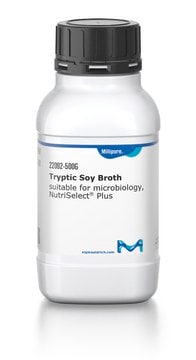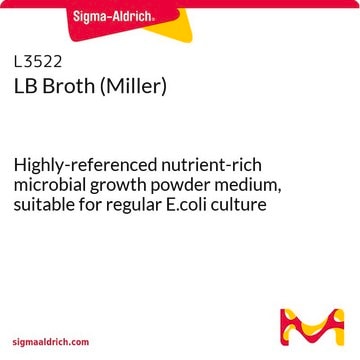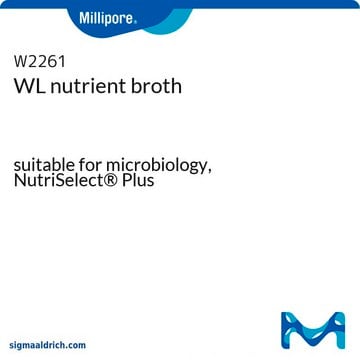70122
Nutrient Broth
Liquid medium used for the cultivation of a wide variety of microorganism, NutriSelect® Plus, suitable for microbiology
Sinónimos:
NB, standard nutrient broth, nutrient broth No.1, Standard - Nutrient Broth
About This Item
Productos recomendados
Quality Level
sterility
non-sterile
form
powder
shelf life
limited shelf life, expiry date on the label
composition
D(+)-glucose, 1 g/L
peptone, 15 g/L
sodium chloride, 6 g/L
yeast extract, 3 g/L
manufacturer/tradename
NutriSelect® Plus
technique(s)
microbiological culture: suitable
final pH
7.5±0.2 (25 °C)
application(s)
agriculture
bioburden testing
environmental
food and beverages
life science and biopharma
microbiology
storage temp.
2-25°C
suitability
Erysipelothrix spp.
nonselective for Brucella spp.
nonselective for Escherichia coli
nonselective for Listeria spp.
nonselective for Staphylococcus spp.
nonselective for Streptococcus spp.
nonselective for bacteria (General Media)
nonselective for coliforms
¿Está buscando productos similares? Visita Guía de comparación de productos
Categorías relacionadas
General description
Nutrient Broth is a general-purpose fluid media containing yeast extract, peptone, sodium chloride and other basic nutritional requirements for the growth of a wide variety of microbes that don’t require specific nutrients. It is used in the routine cultivation of microorganisms from both clinical and non-clinical samples. Addition of different biological fluids like blood, serum, egg yolk etc. can make it suitable for cultivation of more fastidious microbes.
Application
•Nutrient Broth No. 1 is used for the routine cultivation of microorganisms not requiring specific nutritional requirements
•It is also used for the enumeration and enrichment of bacteria.
•Nutrient Broth No 1 can be used as a base for preparing special culture media.
Preparation Note
Footnote
The designations basic, plus, or prime are added to indicate the quality control level, from basic quality control to standard QC plus to prime for full regulatory compliance.
Legal Information
Storage Class
11 - Combustible Solids
wgk_germany
WGK 3
flash_point_f
Not applicable
flash_point_c
Not applicable
Elija entre una de las versiones más recientes:
¿Ya tiene este producto?
Encuentre la documentación para los productos que ha comprado recientemente en la Biblioteca de documentos.
Los clientes también vieron
Artículos
Streptococci- Overview of Detection, Identification, Differentiation and Cultivation Techniques
Streptococci- Overview of Detection, Identification, Differentiation and Cultivation Techniques
Streptococci- Overview of Detection, Identification, Differentiation and Cultivation Techniques
Streptococci- Overview of Detection, Identification, Differentiation and Cultivation Techniques
Nuestro equipo de científicos tiene experiencia en todas las áreas de investigación: Ciencias de la vida, Ciencia de los materiales, Síntesis química, Cromatografía, Analítica y muchas otras.
Póngase en contacto con el Servicio técnico











